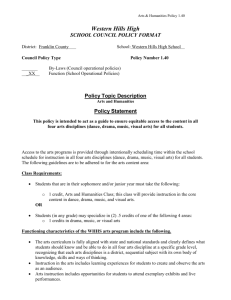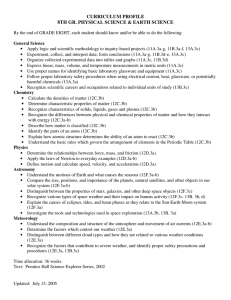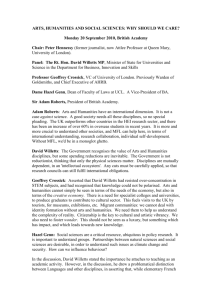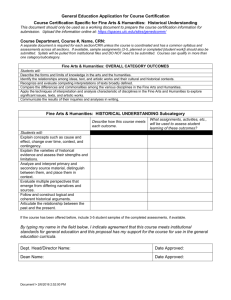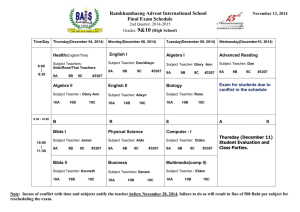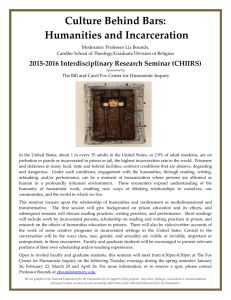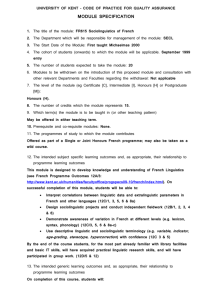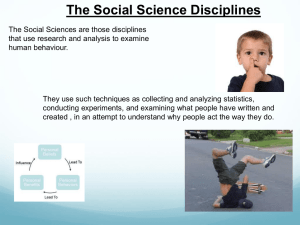SE606 Connections - University of Kent
advertisement
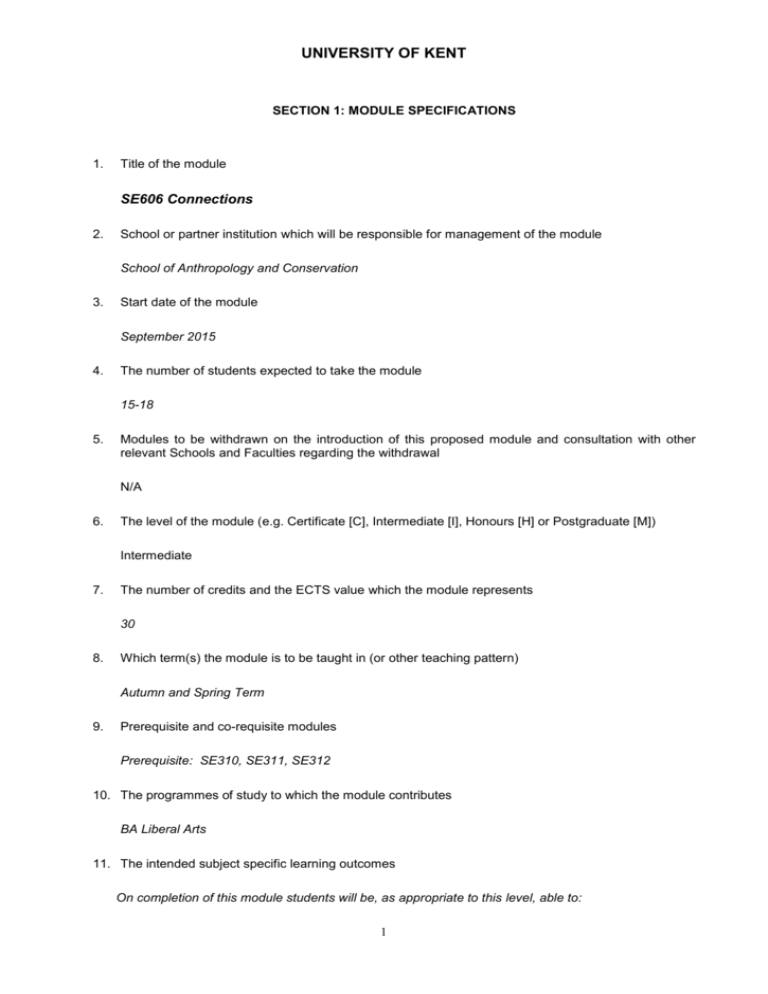
UNIVERSITY OF KENT SECTION 1: MODULE SPECIFICATIONS 1. Title of the module SE606 Connections 2. School or partner institution which will be responsible for management of the module School of Anthropology and Conservation 3. Start date of the module September 2015 4. The number of students expected to take the module 15-18 5. Modules to be withdrawn on the introduction of this proposed module and consultation with other relevant Schools and Faculties regarding the withdrawal N/A 6. The level of the module (e.g. Certificate [C], Intermediate [I], Honours [H] or Postgraduate [M]) Intermediate 7. The number of credits and the ECTS value which the module represents 30 8. Which term(s) the module is to be taught in (or other teaching pattern) Autumn and Spring Term 9. Prerequisite and co-requisite modules Prerequisite: SE310, SE311, SE312 10. The programmes of study to which the module contributes BA Liberal Arts 11. The intended subject specific learning outcomes On completion of this module students will be, as appropriate to this level, able to: 1 UNIVERSITY OF KENT a. Demonstrate knowledge and understanding of key discourses within the sciences, humanities and social sciences, how they were implemented, and their impact on broader society b. Understand how to develop and test hypotheses across a disciplinary range spanning social sciences, natural sciences and humanities using study design approaches appropriate to the disciplines c. Understand the utility and interpretation of qualitative and quantitative data d. Demonstrate the ability to critically evaluate primary and secondary literature across a disciplinary range spanning social sciences, natural sciences and humanities appropriate to the disciplines e. Demonstrate an ability to comprehend, and debate, as appropriate topics across a disciplinary range spanning social sciences, natural sciences and humanities 12. The intended generic learning outcomes In completing this module students will demonstrate, as appropriate to this level the ability to work both independently and as part of a research group using peer support, diplomacy and collective responsibility in pursuit of the following learning outcomes: a. Research skills: how to formulate research questions and hypotheses and how to address problems across a range of disciplines b. Analytical skills: interpretation of arguments, evidence and data; marshalling information from published sources; critical evaluation of own research and that of others c. Information technology: use of appropriate technology to retrieve, analyse and present information d. Numerical evaluation: the use of appropriate analytical methods in handling statistical evidence and data e. Reasoning: how to construct arguments within different intellectual contexts and disciplines; how to formulate and address research questions and problems f. Communication: how to communicate across disciplines; how to mediate key ideas between disciplines; how to speak and write persuasively in discursive contexts g. Reflection: make use of constructive informal feedback from staff and peers and assess own progress to enhance performance and personal skills h. Self-motivation and independence: time and workload management in order to meet personal and group targets and imposed deadlines i. Team work: the ability to work both independently and as part of a research group using peer support, diplomacy and collective responsibility r 13. A synopsis of the curriculum One of the core concepts behind the Liberal Arts degree is maintaining communication and debate between the diverse groups of students the programme attracts. Through collective discussion and debate around seminal readings, this module will equip Liberal Arts students with a broad-ranging grasp of the full field of social sciences, natural sciences, arts and humanities. The topics covered depend on the optional modules and particular knowledge streams chosen by that year’s cohort of students. A concern with politics and current developments continues to influence debate and discussion throughout the second year. Engagement with the Nuffield Curricula will involve further pedagogical familiarization with quantitative methods across the disciplines. 14. Indicative Reading List Alan Badiou, The Century. London: Polity. 2007. Susan Buck-Morss, Thinking Past Terror: Islamism and Critical Theory on the Left. London: Verso 2003. Nessa Carey, The Epigenetics Revolution: How Modern Biology is Rewriting our Understanding of Genetics, Disease and Inheritance. London: Icon Books. 2012. T. J. Clark, Farewell to an Idea: Episodes from a History of Modernism. New Haven: Yale. 1999. 2 UNIVERSITY OF KENT Sheila Jasanoff, States of Knowledge: the Co-production of Science and Social Order. London: Routledge. 2004. Bruno Latour, We Have Never Been Modern (trans. Catherine Porter). London: Harvester Wheatsheaf. 1993. Donald Mackenzie, An Engine, Not a Camera: How Financial Models Shape Markets. Cambridge: MIT. 2008. David P. Mindell, The Evolving World Evolution: Evolution in Everyday Life. Cambridge: Harvard. 2006. Edward Said, Culture and Imperialism. London: Vintage. 1994. 15. Learning and Teaching Methods, including the nature and number of contact hours and the total study hours which will be expected of students, and how these relate to achievement of the intended module learning outcomes Study hours: 300 overall Seminars: 48 hours Seminars will focus on close discussion of core texts with the aim of drawing student experience in other modules, both Liberal Arts and in others drawn from across the university that they have engaged with, into debate with core texts for understanding scholarship in the contemporary period. These will address learning outcomes 11a, 11b, 11c, 11d, 11e, 12a, 12b, 12e, 12f, 12g and 12i. Core readings will be researched, contextualised and presented to seminars by students whose learning trajectories have familiarised them with the fields they emerge from in coordination with others unfamiliar with those discourses, thus addressing 12b, 12c and 12h. Computing and Quantitative workshops: 24 hours. Workshops in statistics, model analysis and economics address 11c,12c and 12d. Computing workshops to develop familiarity with analytic programmes, both quantitative and qualitative, will address 11c and 12c. Self-study and assessments: 228 hours This will comprise seminar preparation, research for assessments and group work, and will address all learning outcomes. 16. Assessment methods and how these relate to testing achievement of the intended module learning outcomes The core aim of the Liberal Arts programme is to facilitate students' abilities to gather, evaluate and integrate an interdisciplinary range of data into well structured, coherently reasoned and creatively thought out arguments motivated by their own engagement in the programme's investigations. The 100% coursework assessment will promote this creativity while inducing students to develop their writing and analytic skills. Assessment will be 100% coursework: 50% from two extended essays (2000 words each) evaluating a particular contemporary topic linked to in class readings and evaluating its resonances and ramifications across a range of disciplinary discourses; 20% from seminar performance (reflecting on the quality of students’ participation in and contribution to the seminar series as a whole, one element of which will be oral presentations on readings (two individual – 6% each) and group exercises (two group presentations of 4% each – collective mark determined by presenters’ self evaluation)), 18% from three exercises (6% each) in quantitative analysis linked to the Nuffield programme, and 12% from a reflective diary/log maintained through the year (students will read, and discuss, diary entries from notable individuals in the arts, social sciences and sciences throughout the year, and the diary as genre will be a topic of seminar discussions). The two essays will address 11a, 11b,11d, 11e, 12a, 12b, 12c, 12e, 12f, and 12h. The seminar evaluation, including the collaborative work on the in class presentation, addresses 11a, 11d, 11e, 12b, 12c, 12e, 12f and 12i. The quantitative work addresses 11b, 11c, 12c and 12d. The diary work addresses 12g. All of the work addresses 12h. 3 UNIVERSITY OF KENT 17. Implications for learning resources, including staff, library, IT and space Two hour seminar each week. Some library resources as well as computing resources to be provided by the Nuffield programme. 18. The School recognises and has embedded the expectations of current disability equality legislation, and supports students with a declared disability or special educational need in its teaching. Within this module we will make reasonable adjustments wherever necessary, including additional or substitute materials, teaching modes or assessment methods for students who have declared and discussed their learning support needs. Arrangements for students with declared disabilities will be made on an individual basis, in consultation with the University’s/Collaborative Partner’s (delete as applicable) disability/dyslexia support service, and specialist support will be provided where needed. 19. Campus(es) where module will be delivered: Canterbury If the module is part of a programme in a Partner College or Validated Institution, please complete the following: 20. Partner College/Validated Institution: 21. University School responsible for the programme: SECTION 2: MODULE IS PART OF A PROGRAMME OF STUDY IN A UNIVERSITY SCHOOL Statement by the School Director of Learning and Teaching/School Director of Graduate Studies (as appropriate): "I confirm I have been consulted on the above module proposal and have given advice on the correct procedures and required content of module proposals" 28 March 2014 .............................................. Date ................................................................ Director of Learning and Teaching/ Rajindra Puri ………………………………………………… Print Name Statement by the Head of School: "I confirm that the School has approved the introduction of the module and, where the module is proposed by School staff, will be responsible for its resourcing" ................................................................. .............................................. Head of School Date ……………………………………………………. Print Name Module Specification Template Last updated February 2013 4
